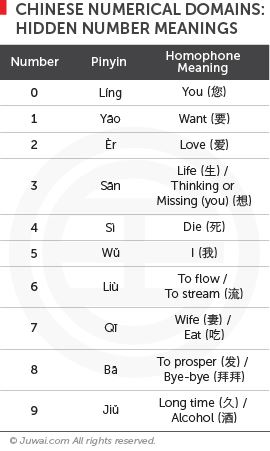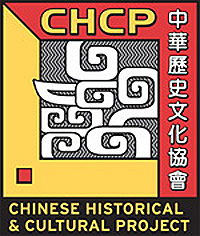|
- Home
- Chinese Numerology
Chinese Numerology
The Chinese concept of numerology is shared with other cultures and is based on mystical as well as I-Ching traditions. The common premise is that certain numbers are associated with good or evil.

The element that makes numbers good or bad in Cantonese is the punning and word play possible in a many-tone language. For example, the number two is fortunate, because it is similar to “easy.” Three is associated with living or giving birth, eight with prosperity, and nine with eternity or power. Combinations of numbers are also prized for their punning references to good luck and prosperity, the two most important issues in the minds of many Cantonese. This belief that certain numbers bring good luck is often put into practice when naming businesses and clubs that hope to attract customers.
People take what the numbers say very seriously, sometimes spending quite a bit of money to make sure the numbers look favorably on them. For example, in 1970 a Hong Kong businessman paid more than $60,000 for a car license plate with the number six, because the words six and longevity are tone variations of the same basic word.
In Hong Kong, the government is well aware of the importance numbers play in its citizens’ lives, and so it auctions off auspicious car license numbers. Between 1973 and 1980, these auctions raised more than $3 million. This phenomena has traveled to the United States now as well. Observe the number of personalized automobile license plates ordered by Chinese with the numbers eight or nine, which of course signal the dear symbols of longevity and prosperity for the owners.
The year 1988, the Year of the Dragon, witnessed an incredible interest in numerology. Throngs of Chinese women rushed to the hospital on the final days of that year, requesting Caesarean deliveries so their child would be born a Dragon child with double prosperity blessing. (The Western year 2000 also coincides with a Year of the Dragon!)
There are also numbers you want to avoid. Unfortunate numbers are one (the lonely number), and four and seven, which represent the death numbers. Some numbers are bad luck when they are combined with other numbers. For example, Chin and Ng are both common Chinese surnames. Chin can mean money and Ng can mean no, or zero. Therefore, a man named Chin would be ill-advised to marry a woman named Ng, because together they would be Chin-Ng, or No-Money.
The possible omens associated with numbers and sounds of numbers by the Chinese, and in particular the Cantonese, is inexhaustible. And so, let us all count our good fortune that this year’s Chinese Summer Festival falls in 1998, a date linked with longevity and prosperity. May it bring both to us all!
By Lim Mar, reprinted from 1998 Chinese Summer Festival program.
The number “3” is used many times in Chinese culture. The only reason that I can think of is because it is mentioned in the I Ching, pronounced E Ching. It stands for Heaven, Earth and Man. When we bow to offer incense, it is always done three times. In bonsai and ikebana, the patterns follow an irregular triangle to represent the trinity of heaven, earth and man.
By Don Gee, Former CHCP Director

